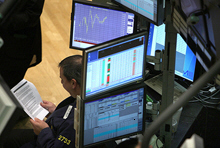
Typical street scene in Santa Ana, El Salvador. (Photo: iStock)
IMF Survey: Time to Rethink Global Economic Framework?
March 26, 2009

The financial sector looked for new ways to generate high yields for its customers’ savings, but there was no way to do this without risk (photo: Newscom)
GLOBAL ECONOMIC CRISIS
Dear IMF Survey:
In my view, your article “IMF Urges Rethink of How to Manage Global Systemic Risk” misses some key points.
The buildup of debt in the United States and some other countries fueled the growth of the world economy over the past few years. Without that, the picture would have been gloomy. Corporate investment in the developed countries was low and would have been even lower had debt buildup not strengthened demand.
The pressure of cheap imports from China and other low-cost countries with pegged exchange rates, the wage restraint and strong export-orientation of countries like Germany and Japan, the generally weak growth of wage income, and the explosion of fuel prices were all factors that, in the absence of fundamental innovations with big market potential, hampered investment.
Export-led growth
In most emerging economies, incentives work strongly in the direction of export growth. The potential for investment in the domestic sector is limited by low incomes, which don’t grow in line with productivity growth because of high and persistent unemployment, and by rent-based structures of the economy, which discourage market-oriented investments without backing of the networks of power and influence.
In the past, export-led growth triggered large investment bouts, financed with capital from abroad. In most cases, this led to severe crises. Consequently, countries strove to reduce their debt and took part in the buildup of the global savings glut.
Productivity improvements through technology transfer in emerging economies’ export sectors did not translate into commensurate wage growth, and therefore into strong, autonomous growth of the whole economy.
The pressure of the emerging economies’ fast-growing exports had a strong negative impact on the growth of wage incomes, income distribution, and investment in developed countries. The growing savings of the rich strata in emerging and developed countries, which got more and more of the cake, did not match the existing investment opportunities worldwide, which depend on the growth of consumption and therefore on the growth of wage incomes. Only through the innovative ways of debt buildup developed by the financial industry, and through growing government debt, was it possible to postpone the economic consequences of this mismatch. The financial sector looked for new ways to generate high yields for the massive savings of its customers, but there was no way to do this without taking dangerously high risks.
New framework needed
It is time to rethink the conceptual framework of the world economy.
It may be too Western-centric to believe in a process that automatically generates modern societies with dynamic internal markets via market liberalization and a few institutional reforms. The current crisis results from the interplay of countries with very different internal economic and cultural structures. The importance of culture seems obvious if you compare countries like Japan and Germany with similarly developed countries that show very different saving rates and wage growth rates.
Rudolf Witzke
Germany







